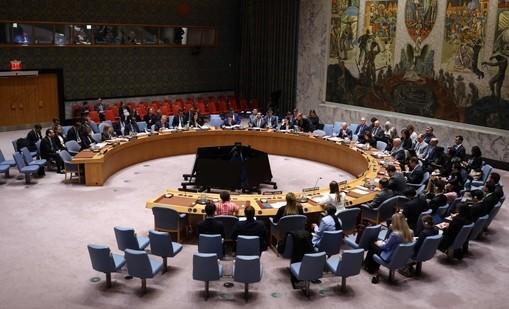
Title: Was LeT involved? UNSC asks Pak on J&K attack, refuses to accept ‘false flag’ claim
The United Nations Security Council (UNSC) has rejected Pakistan’s claim that the recent Pahalgam attack in Jammu and Kashmir was a “false flag” operation, instead, it has asked Pakistan to provide evidence to prove the involvement of non-state actors in the incident. The UNSC members, during a closed-door meeting, also questioned whether the Lashkar-e-Taiba (LeT), a Pakistan-based terrorist outfit, was likely to be involved in the attack.
The Pahalgam attack, which took place on October 11, left several tourists injured, with the perpetrators targeting a bus carrying pilgrims to the famous Amarnath shrine. The incident has sparked widespread outrage and concern, with many questioning the involvement of terrorist organizations in the attack.
Pakistan, however, has been quick to deny any involvement of its territory or citizens in the attack, claiming that it was a “false flag” operation designed to create tensions between India and Pakistan. Pakistan’s Foreign Office spokesperson, in a statement, said that the attack was a “concocted drama” aimed at destabilizing the region.
However, the UNSC members have refused to accept Pakistan’s narrative, demanding concrete evidence to back up its claims. According to reports, some members of the UNSC even brought up the targeting of tourists on the basis of religion, highlighting the need for a thorough investigation into the incident.
The UNSC’s rejection of Pakistan’s claim comes at a time when tensions between India and Pakistan are already running high. The two countries have had a tumultuous relationship in recent years, with frequent exchanges of fire and accusations of each other’s involvement in terrorist activities.
The Pahalgam attack has further escalated tensions between the two nations, with India accusing Pakistan of sponsoring terrorism in the region. Pakistan, on the other hand, has denied any involvement in the attack, claiming that it is a “fabricated” incident aimed at destabilizing the region.
The UNSC’s decision to question Pakistan’s involvement in the attack is significant, as it sends a strong message to the international community that the organization will not tolerate any attempts to hide the truth or manipulate facts. The UNSC has a long history of condemning terrorism and supporting efforts to combat it, and its rejection of Pakistan’s claim is a significant step in that direction.
The LeT, which is based in Pakistan, has a long history of involvement in terrorist activities in the region. The outfit, which was founded in the 1980s, has been responsible for several high-profile attacks in India, including the 2008 Mumbai attacks that left over 160 people dead.
India has long accused Pakistan of providing safe haven to terrorist outfits like the LeT, and has demanded that Pakistan take concrete action to curb the activities of these groups. Pakistan, however, has consistently denied any involvement in terrorist activities, claiming that it is a victim of terrorism itself.
The UNSC’s decision to question Pakistan’s involvement in the Pahalgam attack is a significant step forward in the efforts to combat terrorism in the region. The organization’s rejection of Pakistan’s claim sends a strong message to the international community that it will not tolerate any attempts to hide the truth or manipulate facts.
As the investigation into the Pahalgam attack continues, it is clear that the international community will be closely watching the developments. The UNSC’s decision to question Pakistan’s involvement in the attack is a significant step forward in the efforts to combat terrorism in the region, and it is hoped that it will lead to a more transparent and accountable investigation into the incident.
In conclusion, the UNSC’s rejection of Pakistan’s claim that the Pahalgam attack was a “false flag” operation is a significant step forward in the efforts to combat terrorism in the region. The organization’s decision to question Pakistan’s involvement in the attack sends a strong message to the international community that it will not tolerate any attempts to hide the truth or manipulate facts. As the investigation into the Pahalgam attack continues, it is clear that the international community will be closely watching the developments, and it is hoped that it will lead to a more transparent and accountable investigation into the incident.



